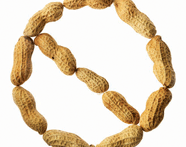Going Nuts Over Nuts

For most people, peanuts and tree nuts are yummy protein rich foods, though for an increasing number of Canadian children with serious allergies, peanuts and tree nuts might as well be arsenic, radioactive waste, or the kryptonite to an otherwise healthy and carefree childhood. First of all, when it comes to discussing nut allergies, the most common question is why the separate referencing between peanuts and other nuts? The reason is because a true nut grows in trees, whereas peanuts grow in the ground and are thus placed in a different categorical family. An allergy to both peanuts and tree nuts is common, as the protein in peanuts is similar in structure to tree nut protein. Nevertheless, there are cases where a person can safely consume peanuts but not tree nuts and vice versa.
According to the York Region Health Services Department, genetics is the prime factor in determining whether a child will develop a nut allergy. If a baby has at least one parent or sibling with a diagnosed food allergy, then she would be considered a high-risk for also developing an allergy. On the other hand, if neither parent nor sibling has a food allergy, then it would be considered unnecessary to restrict certain foods from your baby’s diet for groundless worrying.
Some women have tried to prevent the onset of a food allergy in their unborn baby by avoiding the particular allergen foods during pregnancy. There is no proof that this practice works, but there is evidence to justify that it can lead to malnutrition for both the mother and unborn baby. Breastfeeding, on the other hand, is proven to be a preventative against food allergies. Health Canada recommends that mothers exclusively breastfeed their babies for the first six months and continue with supplemental breastfeeding until age two at a minimum. No research has confirmed that avoiding allergen foods while breastfeeding will reduce the risk of developing a food allergy. When it comes to introducing nuts into a high-risk baby’s diet, the jury is still out. Researcher have not quite agreed on the best time to try your baby on the potential allergens, but the general advice is that peanuts and tree nuts should not be offered to your child until she is three years old. That being said, it must be noted that delaying a child’s exposure to peanuts and nuts will not prevent the development of an allergy, only postpone it. When introducing peanuts and nuts, only give a teaspoon amount to your baby in the morning, while keeping tabs on her throughout the day to monitor for an allergic reaction. If there is no reaction, you can up the amount of the food as the week goes on. Medical experts advise that only one new food item should be introduced to your baby each week. Make sure that it is either pure peanuts or nuts your baby is consuming. However, in case your baby has a mild allergic reaction to any of the nuts, wait a month before trying her out on nuts again. Obviously, a severe allergic response requires immediate emergency, medical attention. If a month has past and your baby still has the mild allergy to nuts, go see your doctor.



